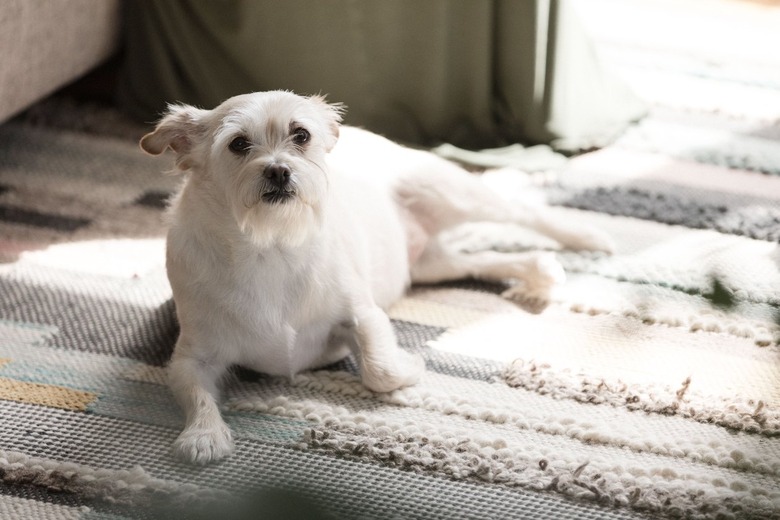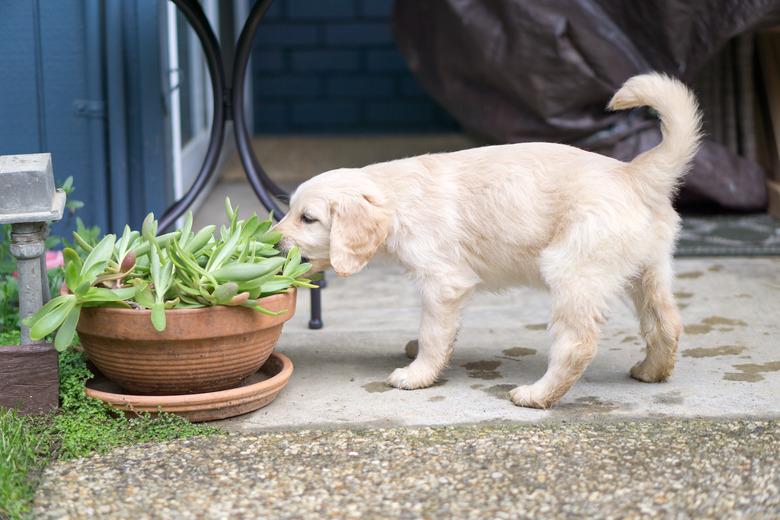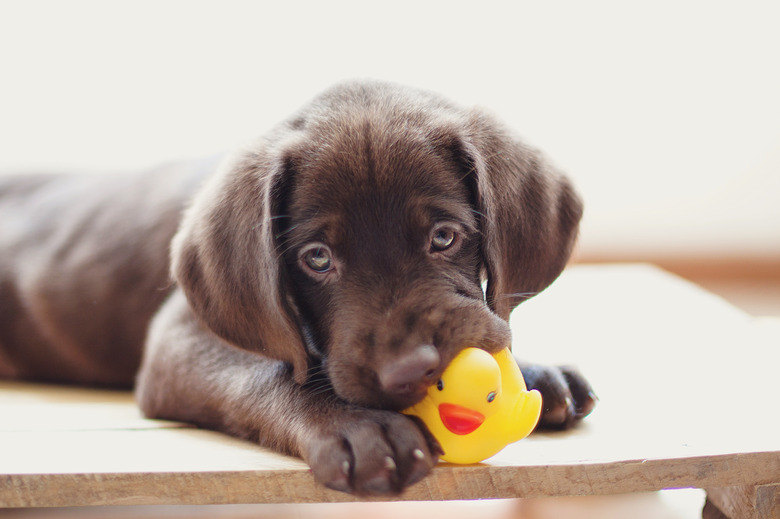The 9 Top Household Hazards For Your Dog
We may receive a commission on purchases made from links.
You'll do anything to keep your best friend safe and healthy — and thoroughly dogproofing your house is the best way to prevent that sweet, curious puppy from getting into harm's way. Although you probably puppyproofed before you brought your new puppy home, you need to modify some of your safety precautions as your dog gets bigger and able to reach hazards he couldn't before. It's also important to stay vigilant when selecting potentially toxic houseplants, storing cleaning supplies or leaving certain foods on the kitchen counter. Dogproofing isn't difficult, but there are many potential dangers lurking in everyday household items for your precocious pup.
1. People Food
1. People Food
You probably know that too many table scraps can be bad for your dog's weight, but some can cause far more dangerous problems. Dogs should never have chocolate, of course, but you should also avoid giving your pet onions, garlic, grapes and raisins. Foods containing salt, garlic and onions are also off limits, even if they only contain garlic or onion powder rather than pieces of onion or garlic.
Of particular concern is an artificial sweetener called xylitol. Found in many sugar-free gums and candies, xylitol has proven lethal to far too many canines. Keep it out of your house altogether if you can or store it safely in a drawer.
Remember that food dangers are sometimes present in the garden as well as the kitchen. Cocoa mulch, for example, can make your dog just as sick as a chocolate bar can. Similarly, grapes on the vine are just as dangerous as grapes on the kitchen counter.
2. Bones and Rawhide Chews
2. Bones and Rawhide Chews
Dog owners are often surprised to learn that bones aren't good for dogs. Cooked bones tend to splinter and create dangerous sharp edges that can harm a dog's mouth and digestive tract. Raw bones aren't as likely to splinter but may contain pathogens. Bones also have the potential to break teeth, and they pose a choking hazard. Given all the other chew toys on the market, it's best to avoid bones altogether.
Rawhide is a bit trickier. Made from dried animal skins, rawhide is perfectly safe for some dogs. For others, rawhide proves difficult to digest but far too easy to rip into chunks that could get stuck in the throat. If your dog chews rawhide slowly and doesn't rip it into pieces, she'll likely be fine. If not, consider safer alternatives.
3. Medications
3. Medications
Unfortunately, some of the medications that help people can hurt dogs. It's vital to keep your medications in a medicine cabinet or somewhere else your dog can't reach. The same is true for toothpastes that contain fluoride, which is poisonous to dogs. Be careful about asthma inhalers as well. Although you may need to keep your inhaler with you rather than tucked away in the medicine chest, it's important to know that dogs who chew on an inhaler can suffer lethal consequences.
In this modern age, it's worth mentioning that, like other medications, marijuana can make your dog quite ill. Be it oils, edibles or buds in their natural state, make sure your medicinal herbs are stashed where your dog can't reach them. Keep your dog's medications out of his reach too. Vets often flavor canine medicines with chicken, beef and other yummy additives so that your dog won't resist pill time, but you don't want him thinking they're a treat and eating too much.
4. Open Gates and Doors
4. Open Gates and Doors
Although the phrase makes for a cute bumper sticker, you don't want your dog to "live like someone left the gate open." Even the most obedient and well-behaved dog may decide to make a break for it if someone leaves a door or gate open. Unfortunately, dogs running amok can get hit by cars, tangle with strays, fall into water culverts or encounter other dangers.
To prevent these problems, train your dog against door dashing, teaching her to sit calmly while you or others enter the home. Make sure you always shut exterior doors behind you and teach your children to do the same. Choose gate latches complex enough that your dog can't open them herself. Another great option is to install a door or gate alarm that sounds when a door is left open so you know you need to close it.
Leaving a door open to dangerous areas like the garage or other rooms filled with things dogs shouldn't get into can also be problematic. If your fur child is especially curious, a good dogproof strategy is to put up a baby gate to prevent them from getting into trouble where you can't see them.
5. Toxic Plants
5. Toxic Plants
There are many plants in both homes and gardens that are toxic to dogs. A reaction to eating a toxic plant can be as mild as an upset stomach or as crucial as a life-threatening emergency. A rather large selection of plants are toxic to dogs, including tulips, sago palms, lilies, azaleas, spider plants, philodendrons and hydrangeas.
The best protection against poisonous plants is to leave them out of your home and garden altogether, instead choosing dog-safe varieties. If you do have dangerous houseplants with which you don't want to part, place them as high as you can so your dog can't get to them. Hanging a basket in front of a window, for example, can provide adequate light for the plant while keeping it out of your pet's reach. In the garden, fence off toxic plants if you can and always supervise your dog's outdoor time.
6. Trash Cans and Dogproofing
6. Trash Cans and Dogproofing
Garbage cans provide both a huge risk and a massive temptation for dogs. Unfortunately, dogs who get into the trash can eat rotten food, food wrappers, discarded bones and other dangerous items. You can prevent this with a lidded trash can but choose carefully.
Some garbage cans, for example, open using a motion sensor, which your dog could activate. A can with a foot pedal to open the lid is probably the best choice, making it hard for your dog to get into but easy for you even if your hands are full.
7. Household Chemicals
7. Household Chemicals
If a chemical is toxic for you, it's probably not safe for your dog. Store cleaning products, pesticides, fertilizer, antifreeze, ice melt, paint thinner, detergents and other chemicals where your dog can't reach them. Always store glues and adhesives safely as well. For an extra safety precaution, you can also use childproof latches on lower cabinets just in case your dog decides to use her nose to wedge in there.
Some adhesives, wood glue in particular, can cause digestive blockages in dogs. Wood glue that contains diphenylmethane diisocyanate, often listed as MDI, can expand in your pet's stomach. When it does, it creates a mass four to eight times larger than the blob of glue the dog ate and requires surgical removal.
8. Oils and Potpourri
8. Oils and Potpourri
Setting out a bowl of potpourri or diffusing some essential oils may smell like heaven to you but remember that your dog's sense of smell is significantly better than yours. What you find pleasant, your dog might find overwhelming. Some oils are toxic to dogs, including pine, peppermint, anise, cloves and citrus. Exposure to these oils can make your dog ill even if he doesn't ingest them.
Of course, ingesting fragrant oils can be worse for your poor pooch. Think twice about where you place a potpourri bowl. Ingested oils cause ulcers in the mouth and other serious problems. Never feed or apply essential oils to your dog without consulting your veterinarian.
9. Any Small Item
9. Any Small Item
If you've ever owned a Labrador, you've probably already learned this lesson: Some dogs will literally eat anything — including sharp objects. New pet owners often assume that their pooch is smart enough to avoid eating nonfood items. She's not. Dogs have been known to swallow toys, socks, electrical cords, loose change, string, deflated balloons, board game pieces, batteries and the list goes on.
Some dogs will eat anything they can get in their mouth. If you're lucky enough to share your home with one of these pups, you'll need to stay vigilant about putting things away and make sure your kids do the same. Sometimes dogs who eat things they shouldn't get lucky, and the offending item goes all the way through them. Stomach issues and intestinal blockages are serious medical problems, however, and are both life-threatening and expensive to treat.
References
- American Kennel Club: Are Rawhide Chews Dangerous for Dogs?
- VCA Hospitals: Why Bones Are Not Safe for Dogs
- Putnam Animal Wellness: 5 Household Items That Are Surprisingly Toxic To Your Pet
- BluePearl Pet Hospital: Common Household Dangers for Pets
- American Veterinary Medical Association: Household Hazards
- Michelson Found Animals: Essential Oils and Animals: Which Essential Oils Are Toxic to Pets?
- ASPCA Pet Health Insurance: 101 Household Pet Dangers
- American Animal Hospital Association: What Are the Most Common Household Toxins for Pets?


